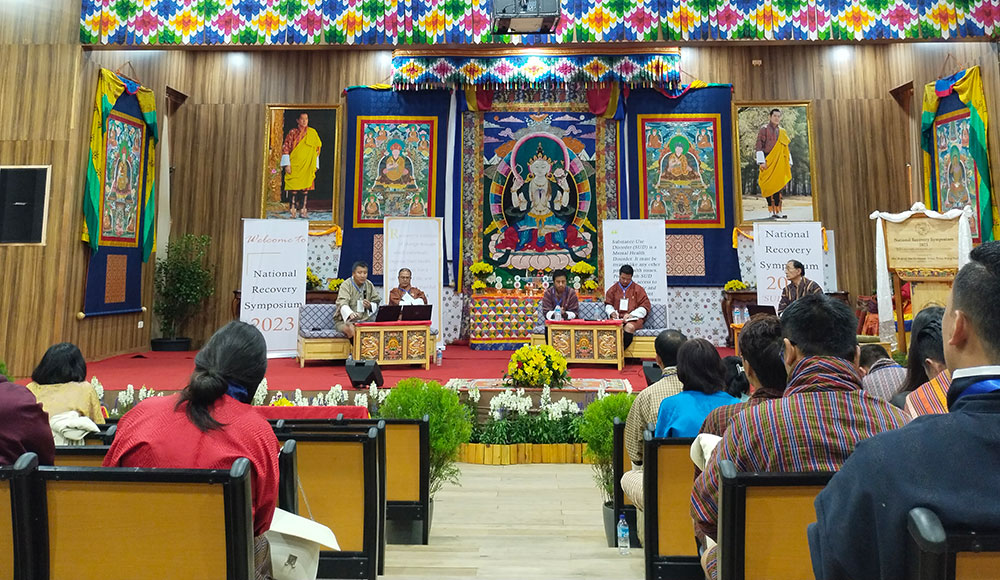… recovering addicts share their success stories
By YK Poudel
“I never realised drugs were my problem – blaming the situation and place I was in led me to get involved in issues with my family, friends and society. Never, did I realise that it started from the consumption of drugs.”
Bhup Dhoj Ghaley, a recovering addict, told the gathering of more than a hundred including leaders, government officials, members from the CSOs, law enforcement, and other participants at the three-day National Recovery Symposium which ended yesterday.
The patron of the PEMA Secretariat Her Majesty The Gyaltsuen during the inaugural ceremony presented certificates of commendation and recognition to the volunteers and those individuals who have been free from substance use for more than three years including Bhup Dhoj Ghaley.
Bhup Dhoj Ghaley said: “As a youth, I took the freedom I was given by my parents in a negative way. The fear of rejection for not using drugs with my friends made me taste drugs.”
Several years ago, he said, when he was caught for the sale and consumption of drugs, the much-needed change occurred. He said, “Inside the custody, a group of friends who were willing to recover changed my perception. My family and the officials at the police station who were helping me recover gave me the motivation to change. Now, I have my own help group where we assist the ones who wish to recover and the ones who need support. The message is not on encouraging to abuse substances but rather come forward to quit.”
After recovering, he started Happiness Centre at Phuentsholing in 2019 which works on skill development as well as re-integration for recovering addicts by reaching out, motivating and helping addicts in their recovery.
To strengthen continuing care and aftercare services for individuals with substance use disorder (SUD) and promote a recovery community for substance use challenges, the symposium was organised.
Similarly, Chogyel Wangdi, 44, has been sober for more than five years.
“Abusing drugs from a young age snatched the luxury of focusing neither on my academics nor a good family life. It led me to a stage of selling my belongings, having a divorce with my wife and children,” he said.
According to him, the spark of change occurred when he got a message from his daughter whom he had not even cared for. While he was trying to sell his phone, a message from my daughter popped up and she said, “Father, please take care of yourself.” That changed his mind.
Chogyel Wangdi owns a cafe in town and volunteers as a mentor. “Social re-integration and acceptance provide the recovering addicts a way forward that is what everyone must do,” he said.
Tenzin Loday, a participant, said that the aftercare programme for individuals in recovery remains underdeveloped, with inadequate follow-up care for those who complete rehabilitation. “Additionally, the challenges and struggles faced by people in recovery go unnoticed.”
According to him, the symposium covered areas such as recovery plenary, concurrent workshops and recovery countdown. “Stigmatising attitudes not only perpetuate stereotypes but also act as barriers to accessing essential support, treatment, and resources.”
He said: “Session on demystifying SUD, breaking the stigma, peer support in recovery and family dynamics gave the participants knowledge on the science of addiction and the neurobiological aspects of SUD.”
The workshop focused on four concurrent topics namely: pharmacological treatment interventions for SUD; Universal Prevention Curriculum-Core course; Family counselling and support; and 12 steps programme to support the recovering individuals.
Programme Officer, Chithuen Phendey Association, Dawa Penjor said that the initiative started with the vision of His Majesty The King on a drug-free society and has made its reach to over 25 individuals to date. “Advocacy and symposiums of such kind is a much-needed measure to assist the recovering individuals to sustain their recovery.”
He said: “Chithuen Phendey Association as the community-based organization to address drugs, alcohol and mental issues believe in sustaining their recovery. Providing the recovering individuals with continuing education (CE) opportunities, small-scale business support, life skills training and projects through social re-integration unit has become successful.”
However, he said, providing continued support after the completion of rehabilitation is a challenge where many may again get back to abusing substances if adequate support and aftercare guidance is not provided.
Health Minister, Dechen Wangmo said: “The PEMA Secretariat has initiated a student well-being programme where every school-going child will be provided annual health check-ups including mental health and wellbeing.”
In the past five years, over 5,800 individuals have been arrested under narcotic drugs and psychotropic substances.
According to World Drug Report 2022, about 284 million people aged 15 and 64 use one form of drug which is a 26 percent increase compared to the previous decades.
Lyonchhen Dr Lotay Tshering said that the treatment of individuals with SUD should extend beyond initial treatment phases and focus on promoting long-term recovery. “The government has planned to improve the services for recovering addicts with the PEMA Secretariat being the pivotal centre.”
“Over the years, Bhutan shall have the centre where individuals willing to recover shall feel free to avail the service and make a society that motivates every individual to refrain from abusing substances,” Lyonchhen said.
For any services related to substance use disorder and mental health, individuals may reach out: Contact the helpline at 1010/ 112 or email helpline: helpline@thepema.gov.bt


